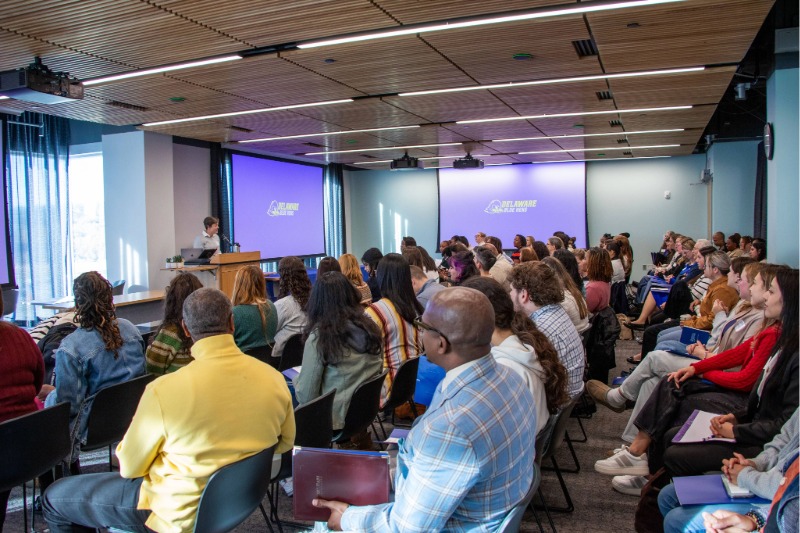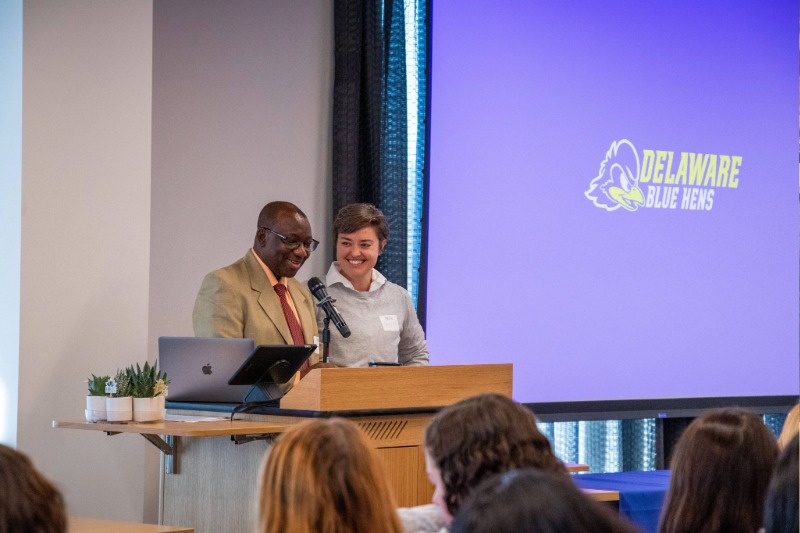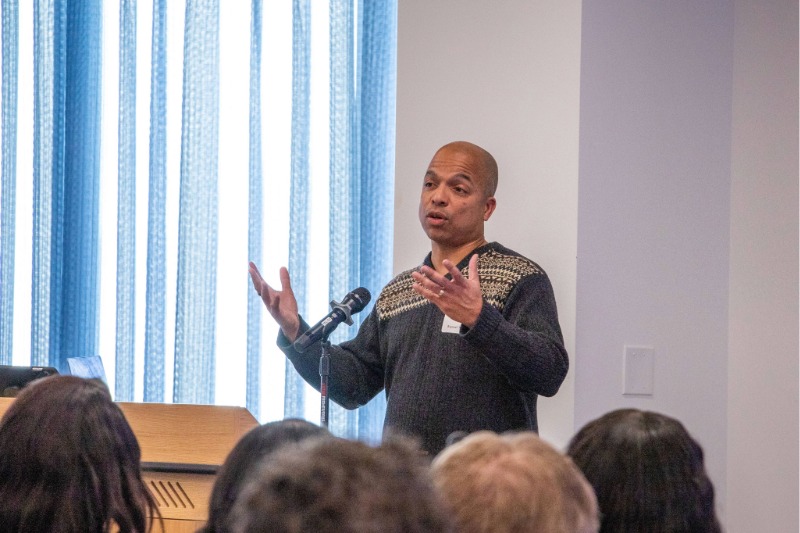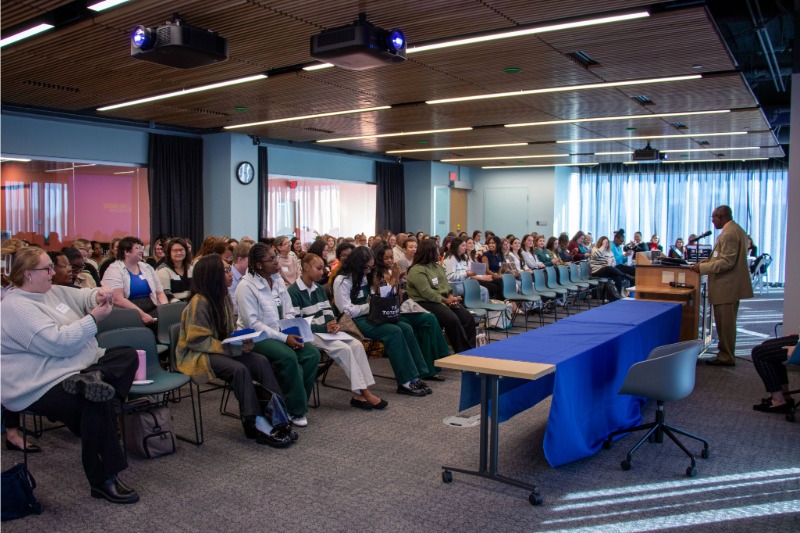Supporting Delaware Communities

University of Delaware addresses the critical need for social workers through new master’s program and community outreach
With specialized training in human development, human services and social systems, social workers are uniquely positioned to support communities in times of crisis or challenging life changes. And the need for social workers is growing, with the U.S. Bureau of Labor Statistics projecting about 74,700 openings across the nation each year, on average, over the next decade.
With its master of social work program and community outreach, the University of Delaware College of Education and Human Development (CEHD) is working to address the critical need for more social workers in Delaware.
“Our college has always been dedicated to improving lives through education, human development and community engagement,” said Rena Hallam, CEHD interim dean and professor in its Department of Human Development and Family Sciences. “The MSW program deepens that commitment by embedding a strong clinical and community-engaged practice component into the college.”
The need for social work in Delaware
Social workers support individuals and families through a wide range of life changes or challenges, including mental health issues and substance use disorders, terminal illness, aging and loss of housing or employment. They often work within hospitals and mental health clinics, helping families access resources or offering psychotherapy services. They also work in schools to support students’ development, implement school policies and connect families to other educational, health or human services.

Despite this important role, there were more than 750 unfilled social work positions within Delaware as of October 2022. And 100% of the school-based positions and 73% of the non-school-based positions required job candidates to hold a master’s degree in social work.
“The shortage remains at the same significant level,” said Ohiro Oni-Eseleh, CEHD assistant professor and MSW program founding director. “The ratio of social workers to school children in Delaware remains at one for every 250 children. Families and older people continue to require specialized social work support, and the social worker shortage persists in the areas of mental health and substance use treatment as well.”
Through its master’s program in social work, CEHD is working to address this critical shortage. This fall, the college welcomed an inaugural cohort of more than 30 students. Through one-year, 16-month, two-year or four-year pathways, they will complete core coursework in critical areas of need, participate in direct practice classes that focus on clinical skills and engage in real-world practicum experiences.

“In our coursework on substance use disorders, for example, we help students understand the social environments that contribute to stress, trauma, poverty and other contextual realities that often predict substance use,” said Raphael Travis, professor and incoming director of the MSW program, who joined CEHD in August 2025 with Assistant Professor Abram Lyons.
“We help them understand factors like genetics and neuroscience that can play a role, as well as social policy and legislative realities that can help or hinder families coping with these disorders,” Travis said. “In our direct practice classes, students drill down into common dynamics that emerge in substance use cases, like coping with adversities in unhealthy ways.”
Through practicum and internship experiences—what Travis describes as CEHD’s “signature pedagogy”—students work in hospitals, schools, assisted living facilities and other community agencies, supporting Delaware residents in local communities.
“We have already begun to provide some support for agencies working in the areas of mental health and substance use disorders, child development and gerontology through our practicum education,” Oni-Eseleh said.

Community-focused social work
In addition to the MSW program, CEHD is supporting Delaware communities through social work outreach efforts. In October 2025, the college hosted a social work conference for 120 social workers, treatment providers, educators and students from Delaware and other states, like New York, New Jersey and West Virginia. Leaders from professional social work organizations, like the National Association of Social Workers and the Association of Healthcare Social Workers also attended.
Themed “Navigating the Ripple Effects: Addressing Mental Health and Substance Use Disorders Across Generations in Families,” the conference included opening remarks from Hallam, a keynote address from Warren Graham, associate clinical professor and associate dean of practicum learning at Columbia University, and presentations and panel discussions from scholars and practitioners, including CEHD and Joseph R. Biden, Jr. School of Public Policy and Administration faculty, staff and doctoral students.
“We wanted to explore the patterns and impact of mental health issues and substance use disorders across generations because the associated challenges and impact do not just start and end with the individual dealing with mental health and/or substance use challenges,” Oni-Eseleh said. “Instead, they affect other family members, often across generations.”
Topics included mental health and substance use disorders, children and families, aging, practicum education and how the conference could help practitioners make meaningful impacts across Delaware communities.
“It was an honor to attend the University of Delaware’s first social worker conference as a Community Advisory Board member for the MSW program,” said Becca McAdams, a licensed professional counselor of mental health at Oak Grove Counseling. “The content was both engaging and timely—offering future social workers valuable insight into the field they’re entering while addressing the real challenges that new professionals are navigating in today’s cultural climate.”

To learn more about the MSW program, visit the program website. To learn more about CEHD research in the social determinants of health, visit its research page.
Article by Jessica Henderson. Illustration by Jeffrey C. Chase. Photos by Shelly Silva.



